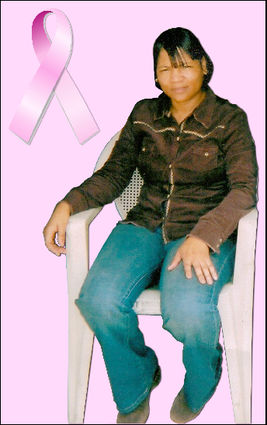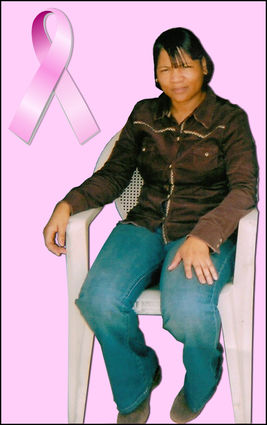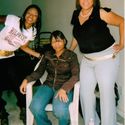Orange woman has new outlook on life after cancer
Last updated 10/10/2012 at Noon
Vicki Brackens, 50, of Orange, was always very health conscious and usually went for her yearly mammograms and annual exams. But, like most women, she got caught up in everyday life of two children in college and grandchildren when she found a lump on her right breast.
Brackins was laying on the couch watching TV in March 2009 when she found the hard lump on the right side of her breast. She usually did her self breast exams in the shower, but when she realized it had been awhile, she felt the urge to do what she had put off. Although the lump was small, in the back of her mind, she knew it was something that didn’t belong in her breast. It was later determined the small tumor was 1.3 centimeters which is the equivalent of a fingernail.
She knew she had to call a doctor because it was also painful. Initially, she panicked but thought it couldn’t possibly be cancer since the horrible disease did not run in her family.
Brackens thought she would wait until her next scheduled appointment in a few months to discuss it with her doctor. Her friend said not to wait and took the initiative to quickly call a gynecologist . As a result, she was able to get an appointment immediately.
According to Brackens, the doctor initially thought it was a cyst and ordered a ultrasound. The image showed a “spider-like” picture. She then was told to get a mammogram for a better picture. Once the mammogram results were returned, she was told to get a biopsy and to “not wait, but get it soon.” The following day she had a biopsy and her worst fears would come true. The results of the biopsy read, “chronic information.”
Brackens would then follow-up with a surgeon who was suspicious of the results and recommended a lumpectomy. Lab tests revealed it was indeed cancer. The following week she had a mastectomy of her right breast and 18 lymph nodes removed. Three of the removed lymph nodes tested positive for cancer.
“Recovery was difficult at first,” Brackens said. “I was scared about what my future was going to hold.”
She began to question if she was going to be around to watch her “grandbabies” grow up.
Brackens admits, “I cried a lot.”
But, she says she woke up one morning with a new revelation and outlook on life.
“I knew I was going to be OK,” she said.
Brackens endured 16 weeks of chemotherapy and took the drug Herceptin to aid in her recovery. She lost her hair, but it is growing back.
To make sure her numbers were low, Brackens initially had blood work done every three weeks to check on her antigens but since then she is no longer required to do frequent tests.
In July she had her other breast removed as a preventative measure.
“Because of my history, I just wanted it removed,” she said.
Brackens is in the process of taking her life back and is undergoing breast reconstruction by having a tissue expander where her breasts once were located.
“It’s painful, but worth it and I’d do it again,” Brackens proclaims.
She will have another surgery in December, which this time she will come home with breasts.
Now more than three years later, she still suffers from anxiety each time she goes to the doctor for a checkup to make sure the cancer had not come back. But, she has the support of family and friends to ease her doubts. She is anxiously awaiting her five year anniversary to be officially a “cancer survivor” and hopefully in permanent remission.
Brackens encourages everyone to get their check-ups and mammograms regularly.
“It could save your life,” she said.
According to information received from the “Gift of Life” foundation, about 1 in 8 women in the United States will develop invasive breast cancer over the course of her lifetime. Breast cancer is the second leading cause of death among women with an estimated 230,000 new cases and 40,000 deaths expected in 2012. About 2,140 new cases are expected in men. However, excluding cancers of the skin, breast cancer is the most frequently diagnosed cancer in women.
This year, 15,347 Texas women will be diagnosed with breast cancer while 2,770 Texas women will die from breast cancer.
Mammography can often detect breast cancer at an early stage, when treatment is more effective and a cure is more likely. Numerous studies have shown that early detection saves lives and increases treatment options.
Pictured: Vicki Brackens, 50, was diagnosed with breast cancer in March 2009.



















Reader Comments(0)